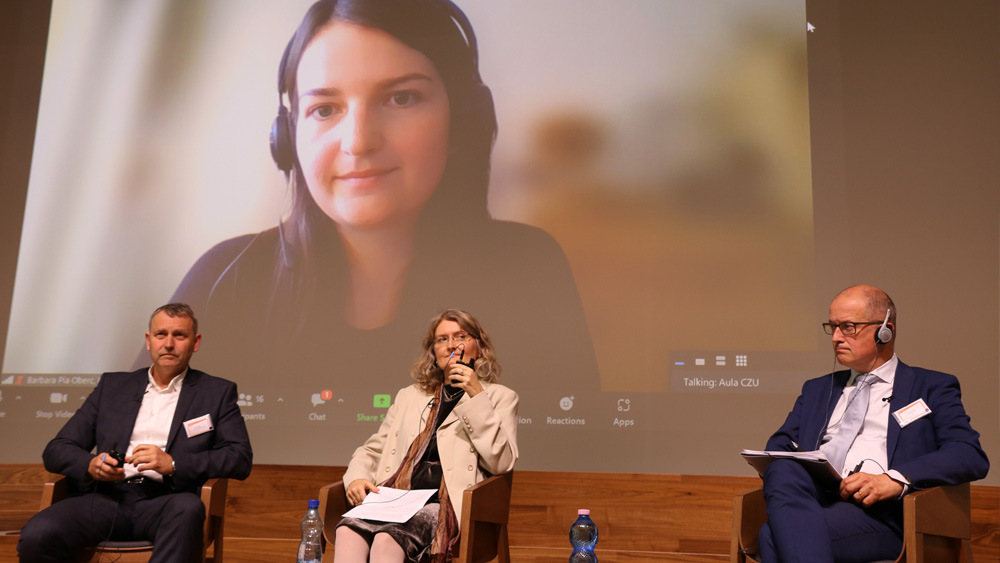More than one pathway to climate-biodiversity-food harmony
Czech Regional Event session 2 summary
Friday, Jun 10, 2022
How best to integrate climate mitigation and biodiversity regeneration in food system transformation? In our third session at the ForumforAg Czech Regional conference held on May 18 at the Czech University of Life Sciences Prague, an expert panel tackled the complexity of this 3-way challenge and how to implement practical solutions, while still giving choices. Discussion flourished as each gave their – and their organization’s – perspective, from farmer to landowner, private sector to NGO.
After introductions by the Moderator, Naděžda Hávová, Jurgen Tack, Scientific Director, ELO, opened by describing the relentless march of the changing climate, and the disastrous effect on biodiversity and food. He outlined the two strategies to tackle climate change – adaptation and mitigation: adaptation is typically the way for individuals and mitigation for larger organizations. Farmers have been adapting for four decades. Recent European policies – to sequester carbon, reduce emissions, improve soils – are a shift towards mitigation. Mr Tack said farmers are developing a positive attitude towards both strategies on climate change. But the relationship between farmers and biodiversity is more complicated. They are competing for land and there are often opposing views from farmers and nature conservation organisations. There is a tendency to take more extreme positions in the discussion.
“In this debate we need much more nuanced opinions,” Mr Tack said. They do not do well in social media or present-day politics, but “it’s the only way forward in a world becoming more and more complex. And in a world where we have to combine solutions for biodiversity, solutions for climate, solutions for food, food security.”
In search of solutions
Barbara Pia Oberč, Policy and Project Officer, European Regional Office in Brussels, IUCN, agreed that climate change and biodiversity loss are “two interlinked existential crises and two sides of the same coin”. She highlighted some statistics to illustrate the pressures: for example, IUCN’s red list assesses over 112,000 species, of which nearly a third are threatened with extinction. For her, the question is not “what do we need, but how do we get there”. IUCN has examined 14 potential pathways which have commonalities but also diversity: “It’s about a combination of what makes sense in the circumstances that you’re dealing with.”
Ms Oberč said debate needs to be about the whole food value chain, not just producing food, including the cost of the transition, calling for “open, constructive and positive dialog among all stakeholders”. Key opportunities coming up: the strategic plans ahead of the new CAP in 2023, the Sustainable Food Systems Framework Initiative, the Pollinator Initiative, Sustainable Use of Pesticides Directive, and the Global Biodiversity Framework Post 2020.
“Trust farmers more so they take responsibility”
The global nature of climate and biodiversity challenges was stressed Dr. Miroslava Bavorová, Associate Professor, Department of Economics and Development, Czech University of Life Sciences Prague. A large share of food insecure people around the globe are smallholder farmers, yet policies in the less developed economies are mainly oriented on achieving food security in Europe. Her impression was that ”everything has to be institutionalized and that farmers need very specific directives and only then they will treat their land in an environmentally friendly way”. Society wants to pay farmers to be environmentally responsibly, yet they are intrinsically motivated to do so. “Farmers do not want to destroy their land… so I would support trusting farmers more so they take the responsibility of being environmentally friendly… this is also already happening, especially in the Czech Republic.” Dr. Bavorová also mentioned Australia, where she said most agriculture policies and direct payments to farmers had been abolished.
Focus on a private sector role
Petr Adler, Head of Sales and Country Leader, Czech Republic, Syngenta, described his company’s role “to bring innovation to the market, share information and be there for the agricultural producers… the ones who share the biggest burden of the changes”. Also to interconnect individual stakeholders, including strategies to communicate to end consumers.
With questions from the audience, debate moved to the Sustainable Use Regulation and the target to reduce synthetic pesticide by 50%. Petr Adler said Syngenta would first come up with a solution that functions within these limits. “But when it comes to solving food crisis, we have to reach outside of Europe and everybody must contribute to the solution for that.”
If you would like to explore the debate in greater depth, watch the recording of the full discussion.


